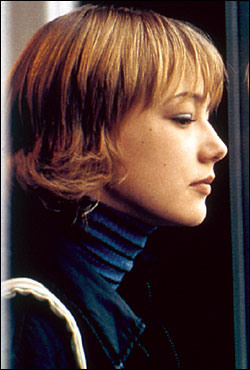As every certainty in her lifelove, trust, even the roof over her headcrumbles and disintegrates, a spark still flickers inside 16-year-old Lilya (Oksana Akinshina). It’s a combination of raw teenage defiance and a pure, misguided faith in the goodness of othersin guardian angels, if you will. Watching that spark dwindle down to its last guttering seconds is almost unbearable.
Yet we do watch Lilya 4-Ever (which runs Friday, May 9 through Thursday, May 15 at the Varsity), mesmerized, because Swedish writer-director Lukas Moodysson’s special gift is to remove any distance between a throwaway child from a ratty housing block somewhere in the former Soviet Union and us. More amazing still, he puts us utterly in her corner.
Moodysson rips straight into his third and finest film, nearly thrusting us inside Lilya’s skin as she runs, terrified, down the cold streets of a Swedish city, away from we don’t know what, seemingly battered by the chords of the German heavy-metal band, Rammstein, on the soundtrack. As she stops on a freeway overpass and we see how she’s been beaten, the savagery in our ears and in front of our eyes is all of a piece.
From that bridge, we move back a scant three months, to what passed for Lilya’s secure old life. The Baltic apartment block where she lives with her mother will surprise no one who’s seen decaying housing projects in any part of the world, yet their flat, decorated with brightly flowered pillows, stenciled walls, and Russian rugs, has an almost cheerful airkilled dead by one look out the window.
LILYA CAN’T WAIT to leave. Gloatingly, she tells anyone who’ll listen that she’s going to AmericaMomma’s (dangerous-looking) Russian boyfriend is taking them. As she packs, she carefully wraps her dearest possession, a sentimental tinted engraving of an angel guiding a young child. The first blow comes at dinner: They’ll get settled in America first, then send for her. In the morning, Lilya’s mask of indifference crumbles. They embrace, both sobbing, but her mother is resolute. Lilya runs screaming after the car, her words like an awful curse: “Don’t leave me; I won’t make it.”
Her tough, truculent Aunt Anna immediately hustles Lilya across town to a fetid hole, empty because its WWII-veteran tenant just died there. Stony-faced Lilya cleans it up, puts her gold-framed angel on the wall, and says the Lord’s Prayer before she sleeps. Most nights, she has the puckish, glue-sniffing Volodya (Artiom Bogucharskij) on her floor, after his father has thrown the 11-year-old runt out into the freezing November rain. (Bogucharskij’s stubborn, love-smitten demeanor is as open and artless as Akinshina’s.)
It’s a household out of Dickens, or Dostoyevskyor the Babes in the Woods, as the two make tents, burrows, even a coffin, to shut out the encroaching world. (In any case, Lilya, with its ever-present angels, feels more like a dark fable than sociology.) There’s no word from America, then no heat, electricity, or food. Demanding help from her aunt, Lilya discovers that Anna has claimed their apartment and will give her nothing in returnexcept the suggestion that Lilya go prostitute herself, like her mother.
Enter the sweetly handsome Andrei, who comes to Lilya’s aid after she’s driven to quick sex at the local dance hall for food money. Even after Andrei proves that he wants “no funny stuff,” even after the two have real, chaste dates, Volodya warns, “He just wants to sleep with you.”
It’s more of a betrayal than that. Andrei contacts his “boss” in Sweden, who can miraculously put Lilya to work the next week, and we see firsthand how effortlessly the child-sex trade works. Underage Lilya is given a bogus passport, and Andrei has a sudden pressing reason not to fly with her “just yet.” In Sweden, there’s only a locked high-rise apartment, a brutal jailer, and an unending procession of grunting, panting men. (Left behind is the grief-stricken Volodya, after a farewell scene even more wrenching than Lilya’s with her mother.)
WHEN HIS SCORE isn’t bullying or cajoling, Moodysson makes his political points visually and gently: We notice that this ugly corner of Sweden is only a few coats of paint different from Lilya’s unnamed native city. He captures the decaying Soviet Union at a former submarine base called “The Pentagon,” where a vast red mural of Lenin stares down from a crumbling wall. For Lilya, the freedom of the West becomes one wolfed-down Big Mac after another in the back of a locked car.
Few directors have the skill to show us real children, unsugared, straight up, and make us feel the losses they suffer this deeply: René Clément, perhaps, with Forbidden Games; Robert Bresson with Mouchette; François Truffaut in The 400 Blows. Moodysson has always had this ability: The kids of his first feature, Show Me Love (1998), riffled through the entire teenage repertoire from suicidal isolation to terrifying self-confidence as though there were no camera in sight. (Ingmar Bergman called it “a young master’s first masterpiece.”) In his second film, Together (2000), a generous and piercingly funny portrait of a mid-’70s commune, it was the hippie kids and the owlish boy next door who blossomed most under his tender gaze.
Moodysson combines humanism and fury into complementary portraits of Lilya’s and Volodya’s unsmirchable purity. He uses Akinshina’s luminous clarity to underscore his heroine’s essential nature. She’s a hellion and school washout, but she isand she remains throughoutan innocent with a generous nature and a complete disbelief in the world’s ugly underside. This makes Lilya the best kind of sedition: It will crack your heart and live inside your mind, whether you want it to or not. Isn’t that what real art is supposed to do?








